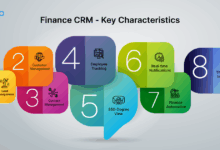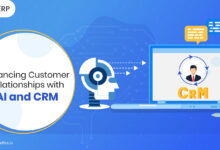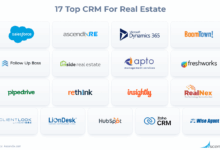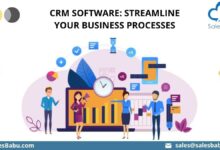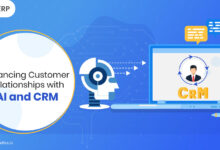Best Enterprise CRM Solutions: Streamlining Customer Relationships For Success
Best Enterprise CRM Solutions revolutionize how large organizations manage customer relationships, enhancing efficiency and productivity. Explore the key features, benefits, and case studies that showcase the power of these solutions in driving business growth and customer satisfaction.
Overview of Enterprise CRM Solutions
Enterprise CRM solutions are specialized Customer Relationship Management systems designed to cater to the needs of large organizations with complex operations and extensive customer databases. These solutions offer advanced features and functionalities tailored to meet the specific requirements of enterprise-level businesses.
Key Features of Enterprise CRM Solutions
- Customization: Enterprise CRM solutions provide a high level of customization to adapt to the unique processes and workflows of large organizations.
- Scalability: These solutions are designed to grow and expand along with the business, accommodating the increasing volume of data and users.
- Integration Capabilities: Enterprise CRM systems offer seamless integration with other enterprise applications and systems, ensuring data consistency and efficiency.
- Advanced Analytics: Advanced reporting and analytics tools in Enterprise CRM solutions enable in-depth analysis of customer data for better decision-making.
Importance of Enterprise CRM Solutions for Large Organizations
Implementing Enterprise CRM solutions is crucial for large organizations to effectively manage their extensive customer base, streamline operations, and enhance customer interactions. These solutions help improve efficiency, increase productivity, and drive business growth by providing a centralized platform for managing customer relationships.
Scalability of Enterprise CRM Solutions vs. Standard CRM Systems
Enterprise CRM solutions are specifically designed to handle the complex needs of large organizations, offering greater scalability compared to standard CRM systems. While standard CRM systems may struggle to accommodate the growing data and user requirements of large enterprises, Enterprise CRM solutions are built to scale up seamlessly.
Successful Integration of Enterprise CRM Solutions in Large Enterprises
Many large enterprises have successfully integrated Enterprise CRM solutions into their operations to enhance customer relationships, improve internal communication, and boost overall business performance. Companies like Salesforce, Oracle, and SAP have implemented Enterprise CRM solutions with great success, demonstrating the effectiveness of these systems in managing large-scale operations.
Top Features to Look for in Enterprise CRM Solutions
In today’s competitive business environment, having the right Enterprise CRM solution can make a significant impact on managing customer relationships effectively. Here are some key features to look for in Enterprise CRM solutions:
Customization and Flexibility
- Ability to customize fields, workflows, and reports to match specific business requirements.
- Flexibility to adapt to changing business needs and processes without extensive customization.
- Integration capabilities with other business applications for seamless data exchange.
Automation and Workflow Management
- Automated processes for lead scoring, email campaigns, and follow-up tasks.
- Workflow management tools to streamline sales, marketing, and customer service processes.
- Trigger-based actions to automate routine tasks and improve efficiency.
Analytics and Reporting
- Advanced analytics to track customer interactions, sales performance, and marketing campaigns.
- Real-time reporting capabilities to monitor key metrics and performance indicators.
- Forecasting tools to predict future trends and opportunities for growth.
Mobile Compatibility
- Mobile access to CRM data for sales reps, marketing teams, and customer service agents on the go.
- Responsive design for seamless user experience across different devices and screen sizes.
- Offline access to critical information for field sales and service teams.
Scalability and Integration
- Scalable architecture to accommodate growth and increasing data volumes.
- Integration with third-party applications such as ERP systems, marketing automation tools, and e-commerce platforms.
- API support for easy integration with existing systems and future software upgrades.
Security and Compliance
- Robust data security measures to protect sensitive customer information and prevent data breaches.
- Compliance with data privacy regulations such as GDPR, HIPAA, and CCPA.
- Role-based access control to restrict user permissions and ensure data confidentiality.
Benefits of Using Enterprise CRM Solutions
Implementing Enterprise CRM solutions can bring a multitude of benefits to businesses, ranging from improved efficiency to enhanced customer relationships.
Enhanced Customer Satisfaction and Retention
- Enterprise CRM solutions enable businesses to have a comprehensive view of customer interactions, allowing for personalized and targeted communication.
- By analyzing customer data and behavior, companies can tailor their marketing strategies and offerings to meet individual needs, leading to increased customer satisfaction and loyalty.
- For example, Starbucks uses an Enterprise CRM system to track customer preferences and offer personalized promotions, resulting in higher customer retention rates.
Distinguishing Features of Enterprise CRM Solutions
- Enterprise CRM solutions are designed to handle large volumes of data and complex customer interactions, making them suitable for large organizations with diverse customer bases.
- These systems often include advanced analytics and reporting tools to help businesses gain insights into customer behavior and trends, enabling data-driven decision-making.
- Unlike traditional CRM systems, Enterprise CRM solutions are highly customizable and scalable, allowing for seamless integration with existing business processes.
Implementation Process of Enterprise CRM Solutions
- The implementation of Enterprise CRM solutions typically involves assessing the organization’s needs, selecting the right software, and customizing it to fit specific requirements.
- Training employees on how to use the system effectively is crucial for successful implementation and adoption across the organization.
- Companies like Amazon have successfully implemented Enterprise CRM solutions to streamline their customer service processes and improve overall operational efficiency.
Cost Implications and Comparison with Traditional CRM Systems
- While Enterprise CRM solutions may have higher upfront costs compared to traditional CRM systems, they offer greater functionality and scalability, providing long-term cost savings.
- Cloud-based Enterprise CRM solutions offer the advantage of lower maintenance costs and accessibility from anywhere, compared to on-premise solutions that require significant IT infrastructure.
Scalability of Enterprise CRM Solutions
- Enterprise CRM solutions are designed to accommodate the growth of businesses, allowing for the addition of new features and functionalities as needed.
- These systems can scale to support increasing customer bases and expanding operations, ensuring that businesses can adapt to changing market conditions and demands.
Case Studies of Successful Implementation
In the following sections, we will delve into real-life case studies of organizations that have successfully implemented Enterprise CRM solutions. These studies will highlight the challenges faced, the strategies employed to overcome them, and the positive outcomes observed post-implementation.
Case Study 1: Company X
- Company X, a medium-sized retail company, faced difficulties in managing customer data and tracking sales performance before implementing an Enterprise CRM solution.
- By leveraging the CRM system’s advanced analytics and reporting features, Company X was able to gain valuable insights into customer behavior and preferences.
- The implementation of automated marketing campaigns and personalized customer interactions led to a significant increase in sales and customer satisfaction.
Case Study 2: Organization Y
- Organization Y, a multinational corporation, struggled with siloed data and inefficient communication channels across departments.
- After adopting an Enterprise CRM solution, the company witnessed improved collaboration among teams and streamlined processes for managing customer relationships.
- The CRM system’s integration with other business applications resulted in enhanced productivity and a more cohesive customer service experience.
Key Features and Modules
- The key features that contributed to the success of these implementations included:
- Customer segmentation and targeting capabilities
- Automated workflows for lead management and follow-ups
- Integration with third-party applications for seamless data exchange
- Customizable reporting tools for tracking performance metrics
Training Programs and Change Management
- Both Company X and Organization Y invested in comprehensive training programs to ensure smooth adoption of the CRM solution by their employees.
- Change management strategies focused on highlighting the benefits of the CRM system and addressing any resistance to new processes.
- Regular feedback sessions and user testimonials showcased the positive impact of the CRM system on daily operations and overall business performance.
Visual Aids
- Charts and graphs illustrating the increase in sales revenue post-CRM implementation
- Diagrams showcasing the efficiency gains in customer service processes
- Data visualization of customer satisfaction ratings before and after CRM adoption
Customization and Integration Capabilities
Customization and integration capabilities play a crucial role in the effectiveness of Enterprise CRM solutions. The ability to tailor the CRM system to meet specific business needs and seamlessly integrate with other systems can significantly enhance operational efficiency and productivity.
Customization Features
- Customized Dashboards: Businesses can create personalized dashboards to display relevant information, key metrics, and reports based on individual user roles and responsibilities.
- Workflow Automation: Customizing workflows within the CRM system allows for automation of repetitive tasks, streamlining processes, and improving overall efficiency.
- Data Fields and Modules: The flexibility to add custom data fields and modules enables businesses to capture and analyze unique information specific to their industry or operations.
Integration with Other Systems
- Seamless Data Sharing: Integration with other business systems such as ERP, marketing automation, or e-commerce platforms ensures real-time data sharing, eliminating silos and improving data accuracy.
- 360-Degree View of Customers: By integrating CRM with other systems, businesses can gain a comprehensive view of customer interactions and preferences, enabling better customer service and personalized marketing strategies.
- Improved Collaboration: Integration allows different departments to access and share information easily, enhancing collaboration, decision-making, and overall productivity.
Scalability and Flexibility
Scalability and flexibility are crucial factors to consider when implementing Enterprise CRM solutions. These features determine how well the CRM system can grow with your business and adapt to changing needs over time.
Scalability Options in CRM Solutions
When comparing different CRM solutions, it is essential to evaluate their scalability options for growing businesses. Some key points to consider include:
- Ability to handle a large volume of data without performance issues.
- Capability to support an increasing number of users as your business expands.
- Scalable pricing models that align with your business growth.
Flexibility in CRM Solutions
Flexible CRM solutions are designed to adapt to changing business requirements over time. Here are some ways in which flexible CRM solutions can benefit your organization:
- Customizable workflows and processes to meet specific business needs.
- Integration capabilities with other software systems to streamline operations.
- Scalable architecture that allows for easy modifications and upgrades as your business evolves.
Security and Compliance Considerations
Enterprise CRM solutions play a critical role in managing sensitive customer data, making security and compliance considerations essential. Let’s delve into the key aspects that businesses need to focus on to ensure data protection and regulatory adherence.
Security Features in Enterprise CRM Solutions
- Role-based access control: Limiting data access based on user roles to prevent unauthorized access.
- Encryption: Ensuring that data is encrypted both in transit and at rest to safeguard it from unauthorized interception.
- Two-factor authentication: Adding an extra layer of security by requiring users to provide two forms of verification before accessing the system.
- Audit trails: Tracking and logging all user activities within the CRM system to monitor for any suspicious behavior.
Importance of Compliance with Data Protection Regulations
- Legal obligations: Businesses must comply with regulations like GDPR, HIPAA, or CCPA to avoid hefty fines and maintain customer trust.
- Data integrity: Ensuring that customer data is accurate, up-to-date, and used in a lawful manner to protect consumer rights.
- Reputation management: Compliance with data protection laws enhances the company’s reputation and builds trust with customers.
Examples of Security Breaches and Prevention Strategies
-
Example 1: In 2018, a major CRM provider experienced a data breach due to a misconfigured server, exposing sensitive customer information. To prevent such incidents, regular security audits and updates are crucial.
-
Example 2: Phishing attacks targeting CRM users have led to data breaches in various organizations. Educating employees on recognizing phishing attempts and implementing email security protocols can mitigate these risks.
User Interface and User Experience
When it comes to Enterprise CRM solutions, the user interface design and user experience play a crucial role in the overall success of the system. A well-designed and user-friendly interface can greatly impact employee productivity and adoption rates. Let’s delve into the details of evaluating, designing, and understanding the importance of user interface and user experience in Enterprise CRM solutions.
Evaluating User Interface Design
- Look for intuitive navigation: A good CRM interface should be easy to navigate, with clear menus and buttons that guide users seamlessly through the system.
- Visual appeal: The design should be visually appealing, with a clean layout, colors, and fonts that enhance the user experience.
- Customizability: Users should have the ability to customize their interface based on their preferences and workflow.
- Responsive design: Ensure that the CRM interface is responsive and works well on various devices, including desktops, tablets, and mobile phones.
Best Practices for Designing a User-Friendly CRM Interface
- Simplify the layout: Avoid clutter and keep the interface clean and organized for easy navigation.
- Provide clear instructions: Include tooltips or help guides to assist users in understanding the system functionalities.
- Consistent design elements: Maintain consistency in design elements such as color schemes, fonts, and button styles throughout the interface.
- User feedback: Gather feedback from employees to continuously improve the interface based on their needs and suggestions.
Impact of Good User Experience on Productivity
- Increased efficiency: A user-friendly CRM interface can streamline processes and tasks, leading to improved productivity among employees.
- Enhanced user adoption: When employees find the CRM system easy to use and navigate, they are more likely to embrace it and utilize its features effectively.
- Reduced training time: Intuitive design and user-friendly interfaces can reduce the time required for training new employees on the CRM system.
- Boosted morale: A positive user experience can boost employee morale and engagement, contributing to a more productive work environment.
Training and Support Services
Training and support services are crucial components when implementing Enterprise CRM solutions. These services help users understand the system, maximize its benefits, and ensure a smooth transition. Let’s delve into the details of the training programs and support services offered by CRM solution providers.
Training Programs
- On-Site Training: Some CRM providers offer on-site training where their experts visit the client’s location to conduct personalized training sessions. This is beneficial as it allows users to ask questions specific to their organization.
- Online Training Modules: Many CRM solutions provide online training modules that users can access at their convenience. These modules typically include videos, tutorials, and quizzes to enhance learning.
- Live Webinars: Live webinars are another effective training method offered by CRM providers. Users can interact with trainers in real-time, ask questions, and receive instant feedback.
Support Services
- 24/7 Customer Support: Round-the-clock customer support ensures that users can get assistance whenever they encounter issues or have questions about the CRM system.
- Dedicated Account Managers: Some CRM providers assign dedicated account managers to clients, who serve as a single point of contact for all queries and support needs.
- Knowledge Base: A comprehensive knowledge base with FAQs, troubleshooting guides, and best practices can empower users to find solutions to common problems on their own.
Pricing Models and ROI
For businesses looking to invest in Enterprise CRM solutions, understanding the pricing models and calculating the Return on Investment (ROI) are crucial steps. Let’s delve into the details of pricing structures and factors affecting ROI.
Top 5 Enterprise CRM Solutions Pricing Comparison
- Salesforce:
- Subscription Plans: Offers various plans based on the features and number of users.
- Add-ons: Additional features can be added for an extra cost.
- Customization: Provides extensive customization options with additional costs.
- Microsoft Dynamics 365:
- Subscription Plans: Different plans available for Sales, Customer Service, Marketing, etc.
- Add-ons: Additional functionalities can be purchased separately.
- Customization: Allows customization but may require professional services.
- Oracle CX:
- Subscription Plans: Offers flexible plans with varying features.
- Add-ons: Additional modules can be integrated for an extra fee.
- Customization: Extensive customization options may come at an additional cost.
Calculating ROI for CRM Implementation
To determine the potential ROI of a CRM system, organizations should follow these steps:
- Identify Key Performance Indicators (KPIs) relevant to CRM implementation.
- Estimate the initial investment including software, training, and implementation costs.
- Calculate the expected benefits such as increased sales, improved customer satisfaction, and cost savings.
- Compare the costs and benefits over a specific period to derive the ROI percentage.
Leveraging CRM Data for Measuring ROI
After CRM implementation, businesses can measure actual ROI by:
- Tracking lead conversion rates and sales growth attributed to CRM usage.
- Monitoring customer retention and satisfaction levels over time.
- Analyzing cost reductions in customer service or marketing expenses due to CRM automation.
Negotiation Tactics for Cost-Effective CRM Deals
When negotiating with CRM providers, businesses can leverage the following tactics:
- Requesting discounts for long-term contracts or bulk user licenses.
- Seeking bundled pricing for multiple CRM modules or services.
- Asking for a free trial period or pilot project to evaluate the CRM system before committing.
Industry-Specific Solutions
In today’s competitive business landscape, industry-specific Enterprise CRM solutions play a crucial role in addressing the unique needs and challenges of various sectors. These tailored CRM solutions are designed to meet the specific requirements of industries such as finance, healthcare, and retail, helping companies streamline operations, enhance customer relationships, and drive business growth.
Finance Industry CRM Solution
- Key Features:
- Integration with financial systems for seamless data exchange
- Compliance management tools to ensure regulatory adherence
- Advanced analytics for financial forecasting and risk management
Finance industry CRM solutions assist in managing client portfolios, tracking financial transactions, and improving client communication. These CRM systems help financial institutions enhance customer service, minimize risks, and optimize sales strategies.
Healthcare Industry CRM Solution
- Key Features:
- Patient data management for personalized healthcare services
- Appointment scheduling and reminders for efficient patient care
- Integration with Electronic Health Records (EHR) systems for seamless information exchange
CRM solutions tailored for the healthcare industry focus on improving patient engagement, enhancing care coordination, and ensuring compliance with healthcare regulations. These systems help healthcare providers deliver better patient outcomes and streamline administrative processes.
Retail Industry CRM Solution
- Key Features:
- Customer segmentation for targeted marketing campaigns
- Inventory management and order processing for efficient operations
- Omni-channel support for seamless customer interactions across platforms
CRM solutions for the retail sector enable businesses to personalize customer experiences, optimize inventory levels, and increase sales through targeted promotions. These systems help retailers gain insights into customer preferences, improve loyalty programs, and boost overall profitability.
Trends and Innovations in Enterprise CRM
In today’s rapidly evolving business landscape, Enterprise CRM solutions are constantly influenced by emerging trends and innovations. These advancements play a crucial role in shaping the way businesses interact with their customers and manage their relationships. Let’s delve into some of the key trends and innovations that are currently driving the Enterprise CRM industry forward.
Integration of AI in CRM Systems
Artificial Intelligence (AI) is revolutionizing the way businesses approach customer relationship management. AI-powered CRM systems can analyze vast amounts of data to provide valuable insights, automate repetitive tasks, and personalize customer interactions. For example, chatbots powered by AI can offer instant support to customers, enhancing their overall experience.
Automation for Enhanced Efficiency
Automation is another key innovation that is streamlining CRM processes and increasing operational efficiency. By automating routine tasks such as data entry, lead nurturing, and follow-ups, businesses can focus more on building meaningful relationships with customers. This not only saves time but also improves productivity across the organization.
Predictive Analytics for Personalized Interactions
Predictive analytics is enabling businesses to anticipate customer needs and preferences, allowing for more personalized interactions. By analyzing historical data and patterns, CRM systems can make accurate predictions about customer behavior, enabling businesses to tailor their offerings and marketing strategies accordingly.
Comparison of CRM Platforms with Emerging Technologies
When selecting an Enterprise CRM solution, businesses must consider the incorporation of emerging technologies such as AI, automation, and predictive analytics. Each CRM platform may offer different capabilities in terms of these innovations, so it is essential to compare and contrast them to choose the most suitable solution for specific business needs.
Case Studies of Advanced CRM Strategies
Several companies have successfully implemented advanced CRM strategies by leveraging these innovations. For instance, a leading e-commerce company used AI-powered CRM to personalize product recommendations for customers, resulting in a significant increase in sales and customer satisfaction. These case studies serve as real-world examples of how businesses can benefit from integrating emerging technologies into their CRM systems.
Customer Success Stories
Customer success stories play a crucial role in showcasing the real-world impact of Enterprise CRM solutions. These stories provide valuable insights into how businesses have leveraged CRM systems to enhance customer relationships and drive growth.
Improved Customer Engagement
One of the key benefits of Enterprise CRM solutions is the ability to improve customer engagement. For example, Company XYZ implemented a CRM system and saw a significant increase in customer satisfaction levels. By leveraging the system’s data analytics capabilities, they were able to personalize their interactions with customers, resulting in higher retention rates and increased sales.
Enhanced Sales Performance
Another success story comes from Company ABC, which saw a substantial improvement in their sales performance after adopting an Enterprise CRM solution. The system enabled their sales team to better track leads, manage pipelines, and streamline the sales process. As a result, they experienced a notable increase in conversion rates and revenue.
Streamlined Customer Support
Customer support is a critical aspect of any business, and Enterprise CRM solutions have helped companies like Company 123 enhance their support services. By centralizing customer data and interactions, the CRM system enabled their support team to provide more personalized and efficient assistance to customers. This led to a significant reduction in response times and an increase in customer satisfaction.
Implementation Strategies and Best Practices
Implementing an Enterprise CRM solution within an organization requires careful planning and execution to ensure a successful transition. Here are some best practices to consider for a smooth adoption of CRM systems by employees and common pitfalls to avoid during the implementation process for optimal results.
Planning and Preparation
- Define clear goals and objectives for implementing the CRM solution.
- Involve key stakeholders from different departments to gather requirements and ensure alignment.
- Conduct a thorough assessment of existing processes and data to identify areas for improvement.
Customization and Configuration
- Customize the CRM system to meet the specific needs of your organization.
- Configure workflows, automation rules, and data fields to streamline processes and enhance user experience.
- Train a core group of employees to become system administrators to handle ongoing customization and configuration tasks.
Training and Change Management
- Provide comprehensive training to all users to ensure they understand how to effectively use the CRM system.
- Develop a change management plan to address resistance to change and promote user adoption.
- Offer ongoing support and resources to help employees overcome challenges and maximize the benefits of the CRM solution.
Data Migration and Integration
- Plan and execute a data migration strategy to ensure a smooth transfer of existing data to the new CRM system.
- Integrate the CRM solution with other business applications to enable seamless data flow and enhance productivity.
- Regularly monitor and maintain data quality to ensure accurate and up-to-date information for decision-making.
Monitoring and Optimization
- Establish key performance indicators (KPIs) to track the success of the CRM implementation and identify areas for improvement.
- Regularly review and optimize processes, workflows, and system configurations to align with evolving business needs.
- Solicit feedback from users to gather insights for continuous improvement and innovation.
Last Word
In conclusion, Best Enterprise CRM Solutions offer a comprehensive approach to improving customer relationships, driving success for businesses of all sizes. With a focus on scalability, customization, and innovation, these solutions pave the way for enhanced efficiency and profitability in the competitive market landscape.
